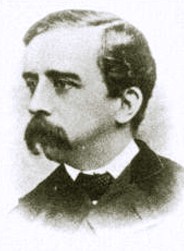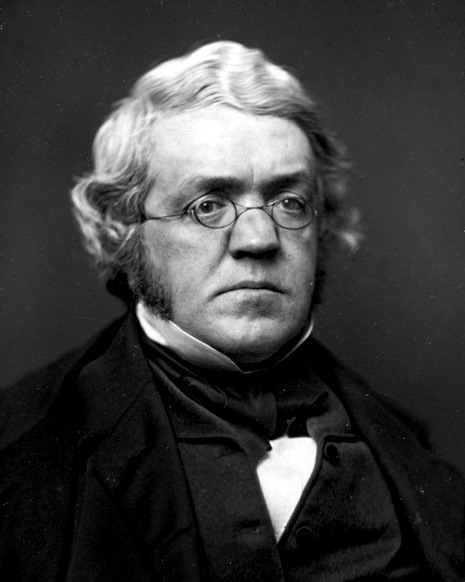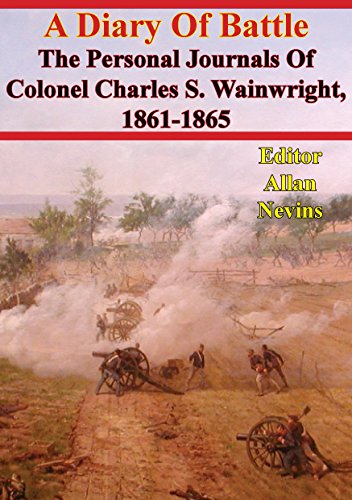“You Might Not Like the Guy”: An English Professor Reads the Journals of Charles Wainwright
ECW welcomes guest author R. Michael Gosselin
If you’ve watched many of the videos from the American Battlefield Trust, you know that Chief Historian Garry Adelman rarely has an unenthusiastic word to say about anything or anybody not named “Dan Sickles.” He’s like Shakespeare’s Henry V: “A largess universal like the sun / His liberal eye doth give to everyone.” Which is why I was intrigued when, during the video, “The Artillery of East Cemetery Hill: 159th Anniversary of Gettysburg,” Adelman said of Charles Wainwright, the 1st Corps artillery commander, “You might not like the guy very much, but you will like his diary,” calling it “bar none…the best single diary of any of the Union artillerists in the East.”
I was hooked, and promptly downloaded an eBook edition of A Diary of Battle: The Personal Journals of Charles S. Wainwright, 1861-1865,” edited by Allan Nevins. For one thing, I have a soft spot for Gettysburg, but I also wanted to find out if the guy really deserved to have Adelman qualify his normal largess. In other words, is Wainwright really that bad? Turns out he is, but more of that anon.
The most fascinating thing about the Journals is that they exist at all. According to Mark Twain, in The Innocents Abroad, “[O]nly those rare natures that are made up of pluck, endurance, devotion to duty for duty’s sake, and invincible determination may hope to venture upon so tremendous an enterprise as the keeping of a journal and not sustain a shameful defeat.” Wainwright kept his journals faithfully for four years, during the most difficult times imaginable. Why? It wasn’t for publication, apparently. The journals didn’t see the light of day during his lifetime, and some of what Wainwright said about the war could have gotten him cashiered, e.g. accusing the administration of prolonging the conflict to stay in power. “The keeping of such a record,” writes Nevins in his Introduction, “amid the storm and stress of the conflict, was a remarkable achievement.”

Another interesting aspect of the Diary of Battle is how much of it is not, in fact, about battle. The scenes of extreme boredom, annoyance, frustration, bad weather, wet clothing, and the varied experiences of days in camp—gourmet food, visits from civilians, playing with a litter of kittens—bring the war to life as much as any account of artillery duels. The detailed description of General Burnside’s attempt to cross the Rappahannock after the Battle of Fredericksburg–a fiasco that would later come to be called the “Mud March”—is particularly grueling.
It is just this chronicling of experiences as he lived them that gives Wainwright’s journals their power. Had he tried to describe events in retrospect, embellished with subsequent knowledge of larger contexts—as, e.g., Sam Watkins does in Co. Aytch—the effect would have been lost. Amazingly, there is a lengthy entry dated for each day of the Battle at Gettysburg, and the presence of a limited narrator—allowing an omniscient reader to fill in the gaps—endows the entries with great force and pathos. The entry for July 2 for instance, mentions engaging the enemy “on a high knoll opposite our north front,” and goes into great detail about the destructive fire on Wainwright’s own batteries before adding, drily, “we were able to shut them up…” What he could not have known, of course, was the corresponding carnage out on Benner’s Hill.
If Wainwright couldn’t see, at least he could listen. He reports hearing the action on Sickles’ end of the line on day two, but writes, “I saw nothing of the affair, so shall say nothing…” And on the following day, all he knows of the Confederate cannonade is that “the roar was continuous and loud as that from the falls of Niagara,” and adds, ruefully, “I should have liked to have had a better view of the grand conflict, but it would not do for me to leave my post…From where I was we could only see the ridge on which the rebel guns were, not the valley between.” After the battle, in an effort to make up for his limited viewpoint on East Cemetery Hill, Wainwright tours the field, writing: “I have no fondness for looking at dead men, and less for seeing those who are suffering from wounds, consequently, I do not relish going over battle grounds. This, though, is the great battle of the war so far, nor is there likely to be one in which I shall get so good a chance to see what slaughter is.”
But it’s time to address Garry Adelman’s warning about the guy. If there’s anyone who is an effective foil for Adelman, it’s Wainwright, whose contemptuous remarks are, in their own way, “universal like the sun.” In a word, he’s a snob. William Makepeace Thackeray, in his 1848 treatise, The Book of Snobs, By One of Themselves, says of the word, “We can’t define it, perhaps. We can’t say what it is, any more than we can define wit, or humour, or humbug; but we KNOW what it is.” Furthermore, “Snobbishness is like Death in a quotation from Horace…’beating with equal foot at poor men’s doors, and kicking at the gates of Emperors.’”

Allan Nevins says of Wainwright, “Observant, methodical, and conscientious, he liked to ponder upon the scenes about him, and particularly the men.” Does he ever. Endlessly. He appears to be constitutionally incapable of saying a kind word about anyone, even those he thinks he’s complementing. He calls his own lieutenant, John Fitzhugh, for instance, “an educated gentleman, just graduated from Yale College; ugly enough to look at, but like the countryman’s horse, a good one to go.”
Wainwright tends to punch down. Of the traumatized residents of Gettysburg, he complains, “Gettysburg may hereafter be classic ground, but its inhabitants have damned themselves with a disgrace that can never be washed out. Had it not been for the wounded and women and children left in it, I should rejoice had it been levelled with the ground.” But he also occasionally punches up. Nevins writes that Wainwright “was so warm a Democrat that he cannot say a favorable word for Lincoln…” In fact, he calls Lincoln “weak,” “ugly,” and “a baboon”—not surprising coming from someone whom the kids today would call a George McClellan “stan”—and ultimately decides, “When calm history comes to be written, Mr. Lincoln must appear as one of the smallest of men, ever harping on trifles.” Ahem.
Nevins also writes that Wainwright “could be very acid in his comments on the uncouth, and the dull-witted; and as a Hudson Valley aristocrat he had an unpleasant vein of supercilious superiority in his attitude toward Negroes, Irishmen…some ‘Dutchmen’ and others whom he considered lesser breeds.” That’s one way to put it, I suppose. Actually, the use of “lesser breeds” is correct; when Wainwright’s snobbishness is filtered through 18th Century racial attitudes, it takes on a very dark tone, indeed. There is no other way to explain what that means than to sample Wainwright directly, and at length:
My man John is going to leave me, and I must try to get me another white man, as I cannot possibly stand these wretched “n*****s.” Nearly all the officers here have contrabands for servants. Hardly any of whom were house servants before they ran away, and consequently are as ignorant of their business as farm hands might be expected to be. To this ignorance must be added the natural laziness, lying, and dirt of the negro, which surpasses anything an ordinary white man is capable of…A negro in their present state has no ambition to get money, and no foresight in providing for the future. Enough to eat and drink, with a few dollars to gamble, is all he wants; idleness is his heaven, which no mere bribe can tempt him out of. Education will doubtless do much to counteract this evil, but not everything. It is so ingrained in their nature that several generations will be required to breed it out. The present generation cannot get rid of it, and left to themselves will die like sheep with the rot, simply because they are too lazy to live.
You can imagine how he feels about Abolition. And this is what Nevins calls “supercilious”! Res ipsa loquitur—the thing itself speaks.
It doesn’t take long for this stuff to get exhausting. Unfortunately, Wainwright indulges in it nearly every time there’s a lull in the action, so that when I finished “Chapter Eleven: Gettysburg,” and stood face-to-face with the prospect of “Chapter Twelve: A Time for Meditation,” I was almost driven from the field. But I persevered, more in sorrow than in anger, knowing that, among much of the Union Army—indeed, much of the entire North—Wainwright’s particular “superciliousness” was merely a difference of degree, not of kind, and maybe not that different, after all. It’s important to keep that in mind. Still, though, one can’t help but give Thackeray the last word: “Off with your cap, Snob; down on your knees, Snob, and truckle.”

Excellent article! Look forward to reading more articles by this author.
Very nice article. Being in a letters, diary, and journals kick recently, I’ll add it to my “wish list.” Thank you!
Glad to read this review of a greeat first hand diary. Thank you for it. You brought new light to me on this book I’ve referenced many times mentally. His criticism of Lincoln never ended, but the book doesn’t have any entries for April 15/16, 1865. I’ll be left to wonder if he was glad for Booth’s act, the way the guy spoke of Lincoln. The guy was a hero though, and I often think of how hard he strove to get his artillery to the appointed Overland destination despite the dark, the muddy crowded roads, the sick artillery horses, which he documented, intersections with cross marching regiments, the bad maps, and yet his boss Warren was criticized for not being timely. Wainwright moved h&h to get his charges to the appointed destinations at the appointed times.
“Down on your knees, Snob, and truckle!” The new Groeling family motto!!
very entertaining read. thanks.
Excellent appraisal of Wainwright and his diary!
Interesting. Further illuminates why most Union soldiers merely packed their bags and went home, when the heaviest, longest, load lifting taskwas largely abandoned.